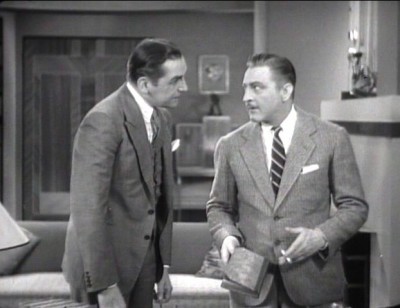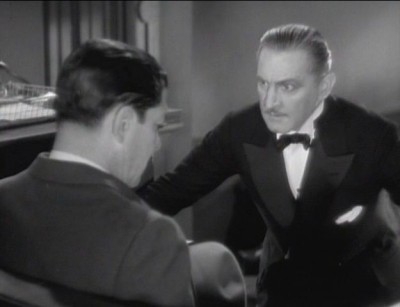
John Barrymore was a busy fellow in 1932. There was Arsene Lupin, Grand Hotel, A Bill of Divorcement, Rasputin and the Empress — and somehow in there he managed to knock off the unassuming little film under consideration here, State’s Attorney. This is a movie that is never going to be on anybody’s list of favorite Barrymore pictures. In fact, it’s scarcely remembered all. That’s not entirely surprising — in part because nearly all its budget went to its star, who at the time was pulling down $150,000 a picture. On a small film like this, that kind of a paycheck doesn’t leave much for the film (though in the days of the studio system, a solid, credible movie could still be put together). This is obviously from the period where Barrymore could still be relied on to show up for work — you don’t make five movies in one year otherwise — but exactly how sober he was is open to question, especially here. There are moments in State’s Attorney when sobriety seems to be a rare commodity. Barrymore is magnetic — drunk or sober — but in his cups, the great man does tend to broaden his playing, which he certainly does here.

The film is an entertaining pre-code drama made during a brief period where courtroom dramas were in vogue — The Mouthpiece (1932), Lawyer Man (1932), this and Barrymore’s own Counsellor-at-Law (1933). If you caught the recent screening of Lawyer Man (1932), you have a pretty good idea of what to expect here. In fact, that two films have fairly similar plots. In this case, Barrymore plays a hotshot criminal lawyer, Tom Cardigan, whose major client, gangster Vanny Powers (William “Stage” Boyd), decides Cardigan could be of more use to him in the district attorney’s office. Despite Cardigan’s warnings that if he goes to the other side, he’ll be on the other side, Powers pulls strings and lands him the appointment. Not surprisingly, Cardigan sticks to his word. It is equally no shock that Cardigan becomes a little too impressed with himself and throws over his mistress — June (Helen Twelvetrees), whom he got off from a prostitution charge early in the film — in favor of ritzy society dame Lillian Ulrich (Jill Esmond — then wife of Laurence Olivier). It’s not the sort of story or movie that will set the world on fire, but it’s entertaining — and something a little more thanks to Barrymore’s presence.
The Asheville Film Society will screen State’s Attorney Tuesday, May 7 at 8 p.m. in the Cinema Lounge of The Carolina Asheville and will be hosted by Xpress movie critics Ken Hanke and Justin Souther.




There are moments in State’s Attorney when sobriety seems to be a rare commodity.
So it’s kind of a stealth precursor to THE VERDICT?
Was the star of The Verdict drunk while making it?
Was the star of The Verdict drunk while making it?
Does it count if he was drunk on salad dressing?
No.